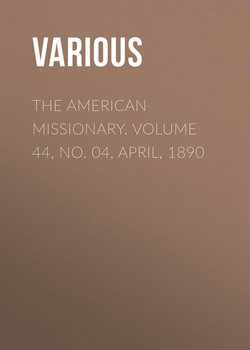Читать книгу The American Missionary. Volume 44, No. 04, April, 1890 - Various - Страница 4
American Missionary Association
A Comparison
ОглавлениеThe French and the Negro
A writer in the March number of The Forum has drawn a vivid picture of France in its poverty, misery and tyranny in 1789, and contrasted with this the thrift, the improved land culture, and the better clothing, food, home and intelligence of the French peasantry of 1889. The Revolution of 1789 broke the tyranny of the old crushing regime and opened the way for the new world that brightens and gladdens the France of to-day. But the Revolution did not itself make the great change; it simply made it possible.
Two factors developed in French character were the practical forces in the new prosperity—economy and the desire for ownership of lands and homes. That economy was pushed, in many cases, almost to the extreme of miserly hoarding. We give below a few brief extracts illustrating the point in question:
"The life led by a comfortable English or American farmer would represent wicked waste and shameful indulgence to a much richer French peasant. I, myself, know a laborer on wages of less than twenty shillings a week, who by thrift has bought ten acres of the magnificent garden land between Fontainebleau and the Seine, worth many thousand pounds, on which grow all kinds of fruits and vegetables, and the famous dessert grapes; yet who, with all his wealth and abundance, denies himself and his two children meat on Sundays, and even a drink of the wine which he grows and makes for the market."
"The French peasant has great virtues, but he has the defects of his virtues, and his home life is far from idyllic. He is laborious, shrewd, enduring, frugal, self-reliant, sober, honest and capable of intense self-control for a distant reward; but that reward is property in land, in pursuit of which he may become as pitiless as a bloodhound."
"Take him for all in all, he is a strong and noteworthy force in modern civilization. Though his country has not the vast mineral wealth of England, nor her gigantic development in manufactures and in commerce, he has made France one of the richest, most solid, most progressive countries on earth. He is quite as frugal and patient as the German, and is far more ingenious and skillful. He has not the energy of the Englishman, or the elastic spring of the American, but he is far more saving and much more provident. He 'wastes nothing, and spends little,' and thus, since his country comes next to England and America in natural resources and national energy, he has built up one of the strongest, most self-contained and most durable of modern peoples."
A very significant parallel is presented in these two pictures to one that may be drawn between the Negro of 1861 and the Negro of 1961. The Civil War corresponded to the Revolution in France. It broke the fetters of the slave, and made his future a possibility. If, now, the Negro will fill out the beautiful picture in imitation of the French peasant, he must imitate him in rigid economy and in the ambition to own his own land and his own home. We do not of course advise the penuriousness of the miser, but the Negro is in little danger on that score. The grandest impulse, even in economy and in obtaining property, is found in a genuine Christian character. This is the work that our ministers and teachers are endeavoring to accomplish, but we are sure It will aid them to urge this practical saving of money, curtailing of needless expense, and the making of most determined efforts to become owners of their own homes.
